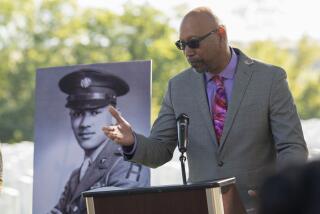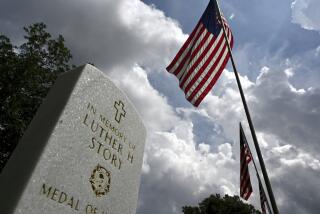Regional Report : Man Injured During World War I Gets Purple Heart After 76 Years : Veterans: Correcting an oversight, the Army gives veteran Fred Roberts the medal he earned when wounded in 1918 at Belleau Woods in France.
The lavender words on the yellowing War Department missive are faded now, but their vague phrasing can still grip a reader. Young Army Cpl. Fred Roberts has been âwounded in action,â it reads; the severity âundetermined.â There is âno further information.â
That terse Western Union telegram was all that came to Gooding, Ida., one day in late August, 1918. Albert and Elizabeth Roberts couldnât know their son had been shelled and attacked with mustard gas when his battalion advanced into Franceâs Belleau Woods days before.
And it was all that ever came from Washington about Fredâs injury in combat--until this March.
A polished Purple Heart now sits atop Robertsâ dresser under a newly minted decree, awarded to him three weeks ago in a ceremony at the Los Alamitos Armed Forces Reserve Center orchestrated by âpupsâ one-third his age.
âI never thought about (the Purple Heart), never knew there was such a thing,â said Roberts, 99, from his daughterâs Temple City home, where he now lives. âI was wounded during a heavy bombardment. The next thing I knew, I was in a vehicle going somewhere.â
Robertsâ quiet journey to formal recognition might serve as inspiration for any of the more than 17,000 surviving U.S. World War I veterans whose meritorious service occurred in generations when Purple Hearts were not awarded.
Gen. George Washington originated the award in 1782, and the medals now bear his portrait. Three Revolutionary War soldiers received the decoration before it was retired; Congress revived it in 1932. The change was made retroactive for World War I veterans, but no machinery was set in motion to search records for men who were injured in combat, the distinction for which the medal is awarded.
*
Roberts had long been discharged and returned to a postal clerkâs job in Gooding. Years passed, a family was raised, other wars were fought, other soldiers were wounded. And all the while, Roberts never determined exactly how to go about pursuing his medal.
Decades clicked by as Roberts retired to a contented life of tending his garden and shooting pool, often with his best friend, Cliff Mackrill. Shortly before his death, Mackrill told his grandson, Army Maj. Jim Sauer, about Robertsâ exemplary service. And Mackrill, based at San Franciscoâs Presidio, jumped into action.
âNobody did this to be evil; it was just a mistake,â Sauer said. âAnd Fred was the type who wasnât going to pursue it, either.â
*
Robertsâ daughter, Barbara Petitt, sent Sauer copies of the 1918 telegram and Robertsâ official discharge. Roberts had moved in with her last year, after his wife died.
â(Sauer) fired that off back East, and the Purple Heart was here in nothing flat,â she said.
The medal was pinned on Roberts at a March 12 ceremony.
âHe said, âWhen you wait for something, itâs more meaningful--thereâs more appreciation,â â Petitt said of her father. â(Heâs) had a lot of chance to think about it.â
Because of Sauerâs efforts, and the notoriety that Robertsâ case has since received, other curious veterans have been coming forth to seek medals, said Ted Bartimus, a spokesman at Los Alamitos.
More than 53,000 American soldiers died in World War I, and Roberts remains grateful that he lived through it.
Should war come again, he said, âPeople wouldnât hesitate to take part and do whatever they could. We have the most wonderful country.â
More to Read
Sign up for Essential California
The most important California stories and recommendations in your inbox every morning.
You may occasionally receive promotional content from the Los Angeles Times.










